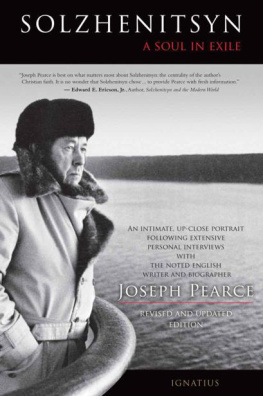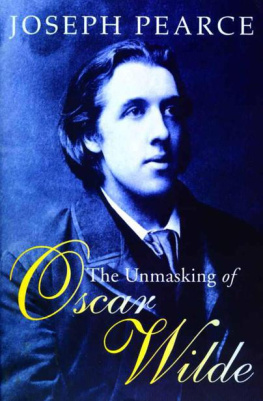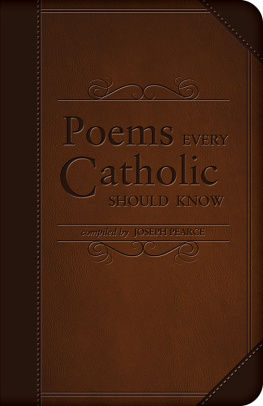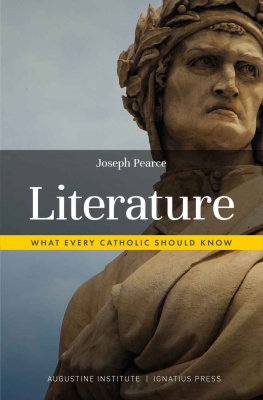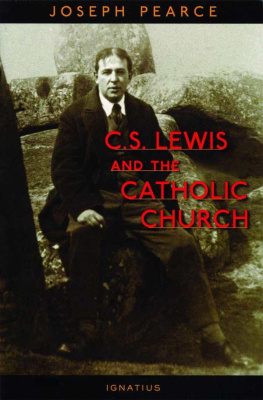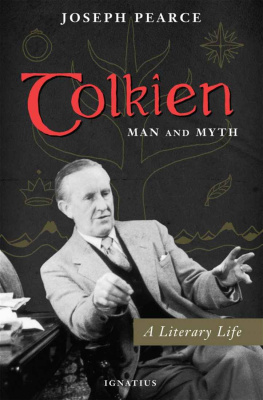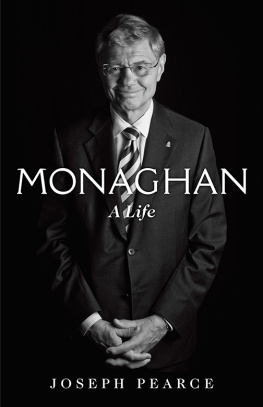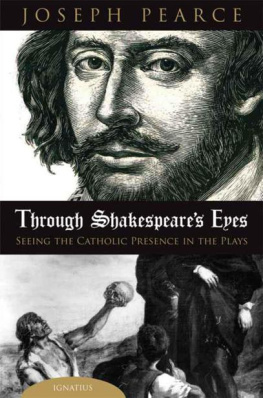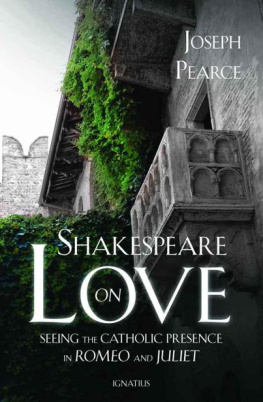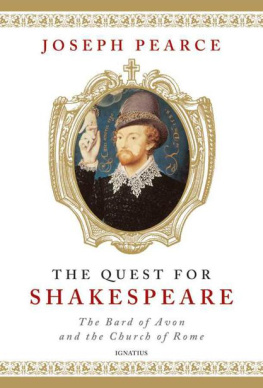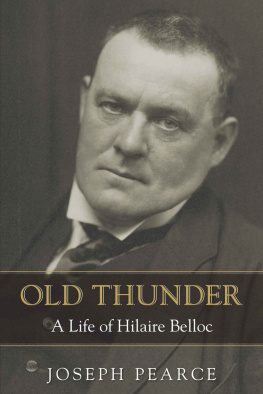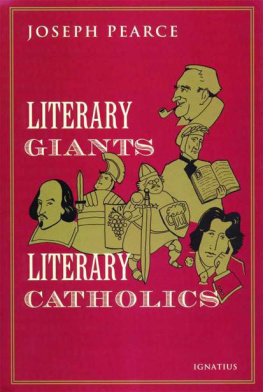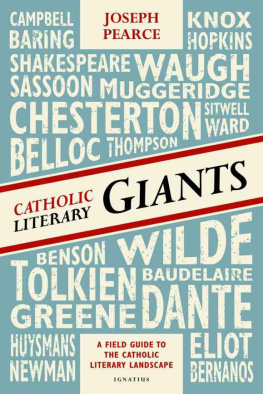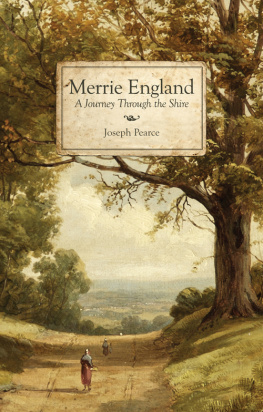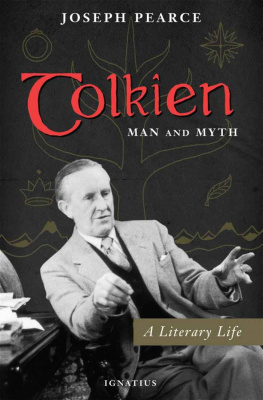

Copyright 2013 by Joseph Pearce
All rights reserved. With the exception of short excerpts used in articles and critical review, no part of this work may be reproduced, transmitted, or stored in any form whatsoever, printed or electronic, without the prior written permission of the publisher.
Cataloging-in-Publication data on file with the Library of Congress.
ISBN: 978-1-61890-065-4
Published in the United States by
Saint Benedict Press, LLC
PO Box 410487
Charlotte, NC 28241
www.saintbenedictpress.com
Printed and bound in the United States of America.
For Albert Arthur Pearce,
who accompanied me
on the Journey.
Requiescat in Pace .
CONTENTS

CHAPTER 1
A SOUL IN SOLITARY CONFINEMENT
I T WAS the darkest day of my life.
I sat in a cell in Londons Wormwood Scrubs prison on the second day of a twelve month prison sentence.
It was not the first time that Id been to prison. Four years earlier I had served a six month sentence. In both cases I was imprisoned for publishing material deemed likely to incite racial hatred, a hate crime under Britains Race Relations Act. I was a leading member of the National Front, a white supremacist organization that demanded the forced removal of all non-whites from the United Kingdom. I was also the editor of Bulldog , the newspaper of the Young National Front, and it was for publishing this journal that I was sentenced to prison on both occasions. There was, however, a huge difference between the twenty-year-old fanatic who had gone to prison four years earlier and the twenty-four-year-old who now sat in utter desolation in a lonely cell, less than two weeks before Christmas in 1985.
Back in January 1982 I had screamed defiantly at the judge who had sentenced me, warning him as I was dragged from the courtroom by the prison guards that the day would come when he would face his own judgment at the hands of the British people. In those days I had been an idealistic fanatic, and I considered myself a political prisoner of an anti-British tyrannical state. I had seen the first prison sentence as an act of willing self-sacrifice for the cause of racial liberation. I began a rigorous regimen of physical exercise, using the bed of my cell as an impromptu gym, scrambling under it to bench press my way into physical shape. I saw myself as a political soldier and a political prisoner who needed to emerge from jail in better shape physically and mentally for the renewal of the struggle. Secretly, in the solitude of my cell, I wrote my first book, a slim volume entitled Fight for Freedom , which I smuggled out with me at the end of my sentence, hiding the handwritten pages within the envelopes of the letters that Id received. I was at war with Britains multi-racial society, working tirelessly to bring it to its knees through the incitement of a race war from which the National Front would emerge, phoenix-like, from the ashes. Such was the strategy which had animated my actions and which had led to my imprisonment.
Much had happened, however, in the intervening four years and it was a very different person who began the second sentence in December 1985. As I looked despondently at the unmentionable abyss of time that the following twelve months represented, it was as though I were descending into a tunnel from which the light at the end was not yet visible. I did not know it but I was entering the dark night of the soul of which St. John of the Cross speaks. Nor did I know that this very day, December 14, was St. John of the Crosss feast day and that he had written his famous poem about the souls dark night whilst he was himself languishing in prison, though in his case for a much worthier cause. Neither did I know that St. John of the Cross had finished writing his famous treatise on the dark night of the soul in 1585, exactly four hundred years earlier. At the time, I had never heard of this great religious poet who, a few short years later, would be one of the most important guides as I made my final approach to reception into the Catholic Church.
The previous day, the first full day of my sentence, had been the feast of St. Lucy, patroness of the blind. It was a singularly appropriate date for one so blinded by bigotry to begin his dark night of imprisonment and his journey towards the light of liberation that it would signify. I was indeed a blind man, oblivious of the saints days on which the miracle of conversion was being wrought, ignorant of the intercession of the saints of whose presence I was unaware, and unable to see the hand of Providence in these coincidences. I had no light in my inner darkness except for the desire for a light I could not see. In the paradoxical light of such darkness, no words suffice to encapsulate my situation at the time better than the words of St. John of the Cross himself:
Upon that lucky night
In secrecy, inscrutable to sight,
I went without discerning
And with no other light
Except for that which in my heart was burning.
It was thus that I found myself fingering the rosary beads that someone had given me during the previous weeks trial. Throughout my life, such beads had been an object of contempt, a mark of the superstitious Mariolatry of the Papists. My father often referred to Catholics as bead rattlers. One day, when I was a boy, he had returned home from the pub and thrown my grandmothers rosary beads out of the window, declaring that we would not have such papist beads in the house. My maternal grandmother, Margaret Kavanagh, had hailed from County Galway, and my mother had brought the rosary home as a memento following her own mothers death in 1969. My mother never would have used the rosary for its intended purpose. Indeed she would not have known how to say the rosary even if she had wanted to. She and her eight siblings had all been brought up as nominal Anglicans, never going to church except for weddings and funerals. It was said that my grandfather cast his wifes priest from their home, shortly after their marriage, after the priest had urged that their children be raised Catholic. I like to believe that my grandmother sometimes told her beads, and Ive heard that she occasionally went to Mass. If true, she would have been alone when she did so. All of her children were brought up, like most nominal Anglicans, as de facto agnostics.
The anti-Catholicism that I had learned at my fathers knee was deepened and darkened by my involvement with the Protestant Loyalists of Northern Ireland. I had travelled to Ulster on many occasions over the previous few years, at the very height of the Troubles which would claim almost four thousand lives before the Good Friday peace agreement was signed in 1998. I had joined the Orange Order, an anti-Catholic secret society, and had fraternized with members of Loyalist terrorist organizations, such as the Ulster Defence Association (UDA) and the Ulster Volunteer Force (UVF). As an Orangeman I knew many anti-Catholic songs, including a sectarian song berating the use of the rosary and celebrating the date on which the Protestants defeated the Catholic King James II at the Battle of the Boyne in 1690. Rather incongruously, it was sung to the tune of Home on the Range:
No, no Pope of Rome,
No chapels to sadden my eyes;
No nuns and no priests,
No rosary beads,
Every day is the Twelfth of July.
Next page

